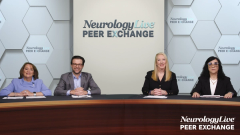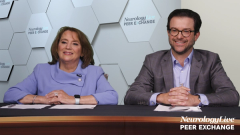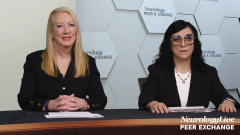
What is a Biosimilar?
Four advanced practice providers discuss biosimilars and how they can play an important role in healthcare.
Episodes in this series

Amy Perrin Ross, APN, MSN, CNRN, MSCN: Hello and welcome to this Neurology Live® Peer Exchange titled, “How Similar Are Biosimilars? A Look Into the Future With Biosimilars in Multiple Sclerosis.” I’m Amy Perrin Ross, an advanced practice clinician and the neuroscience program coordinator at Loyola University Medical Center. Joining me today in this discussion are 3 of my colleagues. To my far right, Patricia Melville. Patricia is a board-certified nurse practitioner in multiple sclerosis [MS] care and a nurse practitioner at the Stony Brook Neurosciences Institute in New York. To my immediate right is John Kramer, a certified physician assistant at Vanderbilt University Medical Center, neuroimmunology department. Finally, on my left is Dr Aliza Ben-Zacharia, a dual board certified acute care nurse practitioner by the ANCC [American Nurses Credentialing Center] and adult nurse practitioner by the Academy of Nurse Practitioners. She’s also an assistant professor at the School of Nursing at Hunter College, City University of New York.
Our conversation today will focus on the who, what, and where of biosimilars, a potential role of biosimilars in multiple sclerosis, and clinical data on biosimilars in development for multiple sclerosis. We will also look ahead to how to incorporate biosimilar agents into MS clinical practice. Welcome everyone, let’s get started.
We’re going to start our conversation today with the first question, and I think I’ll ask John as we start out. Biosimilars, as we know, are new to those of us who have been living and breathing MS for many years. Exactly what is a biosimilar? What are the differences between a generic and a biosimilar version of a medication?
John Kramer, PA-C: Sure. Biosimilars are biopharmaceutical drugs that are similar to a reference product, which are biologic drugs that already have been approved by the FDA for various clinical disorders. Now, it’s a unique scenario in MS, Amy, as you mentioned, because we have gotten used to having small molecule generic drugs become approved for use by our patients with MS. In addition to that, we are also familiar with a medication called rituximab, which is used off label of course for multiple sclerosis and also for NMOSD [neuromyelitis optica spectrum disorder]. But what we have not seen as of yet is the use of a biosimilar drug that is approved based on a reference product in the world of MS. What’s unique and different about these biosimilar medications in terms of their FDA approval is that they undergo a very rigorous testing process for purity, potency, and safety before they are allowed to be given to patients living with multiple sclerosis.
Amy Perrin Ross, APN, MSN, CNRN, MSCN: Good. Any other thoughts from my panel members?
Aliza Ben-Zacharia, PhD, DNP, RN, ANP-BC, FAAN: If you think about biosimilars, they are large molecules produced by living microorganisms, and when you compare it to a generic drug, they are produced by chemical substances. That’s one of the, I believe, major differences between generic medications and biosimilars. We have some experience with generic medication in MS. For example, glatiramer acetate, there are probably about 4 or 5 generic medications. And recently, a generic medication was approved for teriflunomide, which complicated our clinical practice and made it more challenging, I would say.
Amy Perrin Ross, APN, MSN, CNRN, MSCN: I agree, and all 4 of us are practicing clinicians seeing patients on a regular, daily basis. As I was thinking about the biosimilars and the discussion we have planned for today, I think about what are some of the challenges that are going to be impacting my practice. One of our challenges as clinicians is to be able to take the definition, John, that you just so nicely put together for us and help our patients understand the differences between biosimilars and generics. I think that’s going to be, as a clinician, one of the biggest challenges I will face because it was an issue that I needed to sit down and think about and differentiate as well. Pat, that brings us to talking about why are biosimilars an important consideration in health care?
Patricia Melville, RN, NP-C, CCRC, MSCN: Thank you, Amy. I think it’s very important, we’re using biological therapy for a lot of our patients with MS, not only in MS though, but in other autoimmune conditions, rheumatological disorders, cancer, genetic disorders. This has become almost the standard of care. Biosimilars have been developed to provide the same efficacy and safety as the reference product, but at a lower cost. As a result, it may improve access to care for some of our patients, because the cost will be less.
Amy Perrin Ross, APN, MSN, CNRN, MSCN: Ideally, the cost will be less, right? As all of us face daily, sometimes it’s not up to us or prescribers in terms of cost management. It’s the specialty pharmacies that are distributing the medications we use. In our practice, we’ve certainly seen a tremendous cost variability, just looking at generic medications. As we begin to look at the biosimilars, we’re going to have to keep that in mind. Yes, our patients can and should expect some cost savings, but it may be not quite as cut and dried. When I’m talking to patients about perhaps moving them from a branded product to a generic, they automatically think, “Oh, good, I get my generics for $3 for a monthly supply.” That’s not always the experience with the MS medications.
Transcript Edited for Clarity
Newsletter
Keep your finger on the pulse of neurology—subscribe to NeurologyLive for expert interviews, new data, and breakthrough treatment updates.













